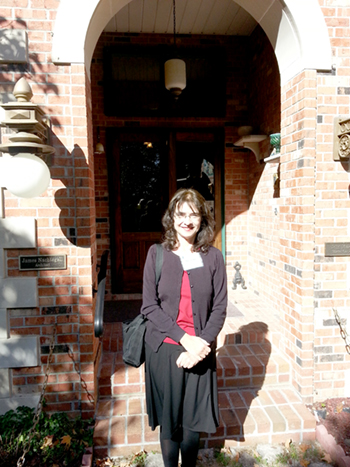 Posted by Mary Grabar, March 12, 2013: Discrimination? What Discrimination? That's the point that sociologist Neil Gross makes (again, and again), now in his latest posting in The Chronicle of Higher Education.
Posted by Mary Grabar, March 12, 2013: Discrimination? What Discrimination? That's the point that sociologist Neil Gross makes (again, and again), now in his latest posting in The Chronicle of Higher Education.
But what do we make of people who do not believe in such a thing as truth? Philosophy professor Jack Kerwick so aptly summarizes the dominant view of academe in his latest Front Page Magazine article, "Inside the Iron Tower: The Life of Conservatives in Academia."
Dissident Prof can testify from her required readings in her early graduate school days that professor Kerwick summarizes the dominant view aptly:
the truth is that for many academics, not only is there no such thing as “the disinterested pursuit of truth.” There is no such thing as truth. I’m not kidding. Truth, along with such related concepts as “reason,” “fact,” “logic,” and “objectivity,” are routinely treated as Eurocentric social constructions by which white men have traditionally oppressed women, non-whites, homosexuals, non-Christians, and the environment.
Jack elaborates on what he sees as the "creed" that has replaced the search for truth in the latest Dissident Prof book, Exiled: Stories from Conservative and Moderate Professors Who Have Been Ridiculed, Ostracized, Marginalized, Demonized, and Frozen Out. (Buy it here.) His essay, "The Creed of Political Correctness," joins essays by five other exiled professors, along with an introduction and afterword by yours truly.
In the afterword, I deal with the position of Neil Gross and colleagues who have been conducting "studies" to prove that if there is any discrimination against conservatives in academia, it is largely by conservatives themselves, who are just not intellectually curious enough for the life of the mind and are not satisfied with the salaries.
Kerwick says quite bluntly,
as things stand at present, the ideal of a free marketplace of ideas to which academia is ostensibly committed to promoting is a fiction. Between this ideal and the current reality, there exists a chasm that is as unbridgeable as it is glaring. Only the self-delusional, the ignorant, and the deceitful can say otherwise.
Then again this is the view of someone who has faced discrimination and who like another contributor finds himself traveling between three and four campuses to eek out a living as an adjunct.
But for those like Professor Gross there is no problem!
He turns to the New Yorker:
Jane Mayer, a writer for The New Yorker, reported that in 2010, Ted Cruz, who had not yet announced his U.S. Senate bid, gave a speech in which he stated that President Obama was a “radical.” Obama was so radical, according to Cruz, that he could just as well have been “president of Harvard Law School,” where, as Cruz told it, “there were fewer declared Republicans in the faculty than Communists.” He elaborated, claiming that when he had been a student there, in the early 1990s, “there were twelve [faculty members] who would say they were Marxists who believed in the Communists overthrowing the United States government.”
(Matthew Vadum, however, verifies Senator Cruz's claim here in PJ Tatler.)
Mayer found Cruz's allegations "baseless," but a larger point is made about conservatives:
Cruz’s comments about Harvard echo the claims of other prominent conservative politicians and commentators, who like to assert that faculty lounges are nests of radicalism. But are they?
Gross couches his denials in the language of reasonableness, like
To answer this question, among others, I analyzed data from surveys and interviews with professors, including a nationally-representative survey of the American professoriate, conducted in 2006 with the sociologist Solon Simmons. My research shows that only about 9 percent of professors are political radicals on the far left, on the basis of their opinions about a wide range of social and political matters, and their self-descriptions (for example, whether they describe themselves as radicals). More common in the professoriate—a left-leaning occupation, to be sure—are progressives, who account for roughly a third of the faculty (and whose redistributionism is more limited in scope), and academics in the center left, who make up an additional 14 percent of professors.
Of course, it is a leftist professor analyzing the data, defining what is "leftist" or "radical," and relying on leftist professors' own self-definitions. They are "diverse,":
a diverse category, encompassing social democrats, radical feminists, radical environmentalists, the occasional postmodernist—and yes, some Marxists. All told, about 43 percent of radical professors say that the term “Marxist” describes them at least somewhat well. (About 5 percent of American professors, over all, consider themselves Marxists.)
Furthermore, even those who openly identify themselves as Marxists do so out of concern for the poor and downtrodden...certainly not to overthrow our government. Says Gross:
In the course of seven years of research, I never encountered any radical professors who advocated “overthrowing the United States government.” Those who are politically committed to Marxism are profoundly concerned with economic inequality and class, believe that things aren’t going to get much better for people at the bottom of the income ladder unless capitalism in its present form gives way, and harbor some hope that things might eventually change—but are generally pessimistic.
Gross's "research" shows that conservatives are under-represented in academia because of a bad cultural fit. We can infer that conservatives are not as concerned about the underprivileged as Marxists are.
 The fact that Marxism as a form of government is antithetical to our republican form of government is not mentioned. Marxism, in its essence, seeks to eliminate the free market and republican government. Today's Marxists like their secure lifestyles and are not about to go out planting bombs. So they assign Howard Zinn's history and embed lessons about evil capitalists in eveything from poetry to math for "social justice." Their efforts are paying off: the latest Pew poll showed that a majority of Americans ages 18-29 think of socialism as a viable form of government.
The fact that Marxism as a form of government is antithetical to our republican form of government is not mentioned. Marxism, in its essence, seeks to eliminate the free market and republican government. Today's Marxists like their secure lifestyles and are not about to go out planting bombs. So they assign Howard Zinn's history and embed lessons about evil capitalists in eveything from poetry to math for "social justice." Their efforts are paying off: the latest Pew poll showed that a majority of Americans ages 18-29 think of socialism as a viable form of government.
Professor Gross has recently published a book. The effort is to deny what conservatives have been saying and what they know. The activist professors and their apologists like Gross have sought to ridicule and deny their charges, and imply that conservatives are paranoid McCarthyites.
Exiled contains essays by only six professors, but they are representative of the situation in academe for conservatives surrounded by liberals like Gross who deny there is any discrimination and ignore or silence dissenters with threats to their livelihood. For a preview, read Mal Kline's excellent column, "Inside the Ivory Curtain," in Accuracy in Academia. (Dissident Prof just loves these poetic word plays!)





